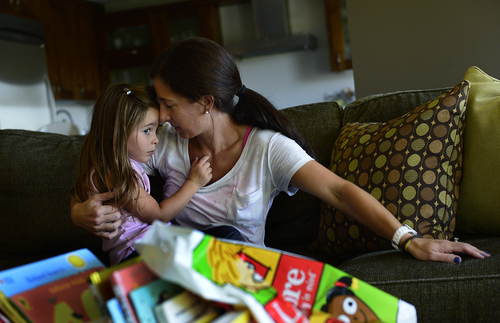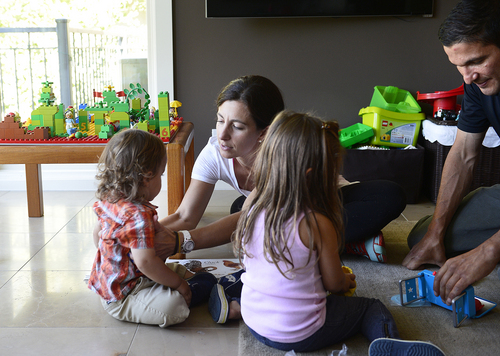This is an archived article that was published on sltrib.com in 2014, and information in the article may be outdated. It is provided only for personal research purposes and may not be reprinted.
Spanking isn't a part of Alethia Bapis Chatzis' parenting toolbox.
"When you're tired, they're tired and your first instinct might be to spank," the Salt Lake City mother of two said Thursday. "Instead of doing that, we try to take each child into a separate room."
And yet, she acknowledges, she has swatted her four-year-old daughter's hand when the girl has tried to bite her two-year-old brother.
"Maybe there is a place and time" for corporal punishment, she said, "but we try not to do it."
Like many parents across the country and in Utah, Chatzis is soul-searching and rethinking discipline choices in the wake of reports an NFL star beat his four-year-old with a tree branch.
While Minnesota Vikings runningback Adrian Peterson faces charges of child abuse after a pediatrician found bloody welts on his son's legs, Utah families have joined a renewed national debate about how best to punish youngsters for misbehaving.
The subject is also at the fore of an upcoming talk from parenting author Janet Lansbury, who visits Salt Lake City next month on a book tour for her newly released guide, "No Bad Kids; Toddler Disciplining Without Shame."
Lansbury advocates for what she calls "respectful parenting." Her approach involves staying calm, firm and consistent as children's outbursts run their course. She coaches parents to avoid yelling and spanking.
Not everyone agrees. If parents see spanking as the best way to keep toddlers in line, said Gayle Ruzicka of the conservative Eagle Forum, they should be able to apply a hand.
"There's a big difference between a couple little swats on the bottom if you don't want them to run out in the road," she said, and "harming and hurting a child to the point that there's blood or bruising."
In Utah, where parental rights are a thriving political movement, the state has been roiled by the question of spanking before. Thirteen years ago, legislators considered a so-called "spanking bill" that would have protected parents from child welfare investigations in some cases. The measure sought to draw a line between abuse and "reasonable" discipline by a parent, involving "the use of spanking or paddling" that stopped short of causing excessive mental or physical harm to the child.
Critics worried it would paint Utah as a state that condones spanking and the bill failed.
The question of whether corporal punishment is a good choice for parents has risen amid national news reports that Peterson first stripped the branch, stuffed the leaves in the boy's mouth, then whipped him until he bled.
Peterson is reported to have later texted the child's mother saying he felt bad. He is still getting a paycheck from the Vikings, but it's unclear when or if he will return to the turf.
Soon after his indictment, Peterson's attorney released a statement saying the father was doling out the type of punishment he received as a child. Peterson said he was disciplining his child the way his parents disciplined him.
Such parents often struggle to discipline children without physical force, Lansbury said. "To them, this is love. You can't teach them otherwise," she added. "It is so deeply engrained in us."
After the charges, former NBA star Charles Barkley said on CBS' NFL show that whipping is routine for black families in the South.
But such broad generalizations are out of place, said Ronald Coleman, a professor of history and African-American studies at the University of Utah.
"Spankings, whether in the south, northeast, midwest, or west — I would like to think we're way past that,and if we're not, we should be." he said. "He may not have intended to, but he caused the boy a great deal of physical pain, and we can't condone that."
In Utah, the state office overseeing school districts requires teachers and other school employees to tell law enforcement officials if they believe someone is abusing a student. Doctors and nurses must also make such reports. But the standards for medical workers and teachers varies from state to state.
A 2002 study by Columbia University found the more often and the harder children are hit, the more likely they are to become aggressive or have mental health issues.
"This is why the early years are so important," Lansbury said Wednesday from her home in Los Angeles. "These years form self and love and relationships," she added, and "become part of us that is hard to shake."
The Columbia study found physical punishment keeps children in line when parents are there, but that the same kids will act out when they're not supervised. Critics said the study took severe abuse into account, so it doesn't accurately reflect the spanking in most families.
Today, Lansbury, who calls the late parenting advocate Magda Gerber a mentor, says she has seen a shift in parents' perspectives toward spanking on her blog. More parents criticize it, and fewer defend it, she said. "I've seen change happen, so I'm hopeful" that will continue, she said.
Chatzis, who helped bring Landsbury to Salt Lake City, said she found the advice helpful for raising her children.
"It's important to remember to be patient" in disciplining children, she said. "We don't have to treat them like they don't understand."
Her mother, Elaine Bapis, said she plans to ask how corporal punishment might hardwire children to dole out such discipline if they become parents.
"How does that violent orientation start right when they're infants?" she said. "I'm certainly going to ask the question in the audience."
Follow Annie Knox @anniebknox
Hear the talk
When • Tuesday, October 14, 2014 at 6:45 p.m. Seating is limited.
Where • Saint Sophia School, 5341 S. Highland Drive, Salt Lake City
Cost • $20. For tickets, (801)424-1297 or brian.lampe@saintsophiaschool.org





